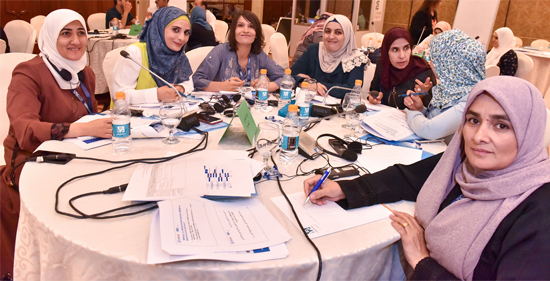
18 Aug Research to Study Barriers and Enablers of Women’s Leadership in Jordan’s Health Sector
Women account for more than 50 percent of the health workforce in Jordan; however, women are largely underrepresented at decision-making levels in the health sector. According to the USAID-funded HRH2030 program’s review of Ministry of Health statistics, women comprise 55 percent of the ministry’s staff, yet hold only 27 percent of management and leadership positions across all levels. A gender audit, also conducted by the ministry, further revealed that women hold fewer than ten percent of higher level administrative roles. Increasing women’s leadership builds on the Ministry of Health’s efforts to promote gender equity and is an important step to strengthen health system resilience and system responsiveness.
To address these disparities, HRH2030 recently launched a national study to explore the barriers and enablers of women’s career progression to management positions in Jordan’s health sector. The research results will inform national human resources for health (HRH) policy and the development of strategies to strengthen women’s leadership in Jordan’s health sector.
“To prepare for this research, we conducted a review of the existing literature on women’s roles in the Jordanian workforce. Reports from both USAID and the United Nations show that most women working in Jordan’s public sector face some degree of job discrimination. For example, female workers could be criticized for working late or be required to provide more detailed justification for leave than their male counterparts. Women who do rise to supervisory positions hesitate to assign tasks to their male employees,” explained Matthew Kuehl, deputy project director for the HRH2030 activity in Jordan.
“We need to gain a better understanding of the issues to ensure that everyone benefits from policies meant to protect workers’ rights and that women have an equal opportunity to lead within the health workforce,” Kuehl added.
The HRH2030 team will conduct the research nationally, targeting urban and rural areas covering Jordan’s north, middle, and south regions. The mixed-methods survey samples will include women and men working at the Ministry of Health, university hospitals, councils, and within the private sector to understand the differences and similarities in experiences across the health sector. Female and male health care providers, including physicians, registered nurses and midwives, pharmacists, and facility managers within the public and private sectors, will engage in interviews as part of the research.
HRH2030 will leverage the expertise of two local researchers, Professor Yousef Khader of the Jordan University of Science and Technology and Dr. Aida Essaid, director of the Information and Research Center at the King Hussein Foundation. A research advisory committee, chaired by former Senator and Minister of Higher Education and Scientific Research Dr. Rowaida Maaitah, will guide the research team. Other collaborating members on the committee include stakeholders from the Ministry of Health, Jordan Nursing Council, Women’s Study Center at the University of Jordan, and Faculty of Nursing at Jordan University of Science and Technology.
“This research gives us the opportunity to explore and identify the reasons why there is a gender gap in managerial positions in Jordan’s health sector,” said Dr. Essaid. HRH2030 will investigate the experiences and perceptions of female career progression in the health workforce and identify factors — including existing policies and practices — that support or impede women’s leadership in the sector.
Thoroughly researching barriers and enablers to women’s leadership in the Jordanian health sector “will provide timely information for decision-makers and legislators to inform their policies and legislation to enhance women’s advancement in management positions,” explained Professor Khader. HRH2030 will work with national stakeholders to develop practical recommendations to gender equity challenges and integrate those into the country’s national HRH strategy.





